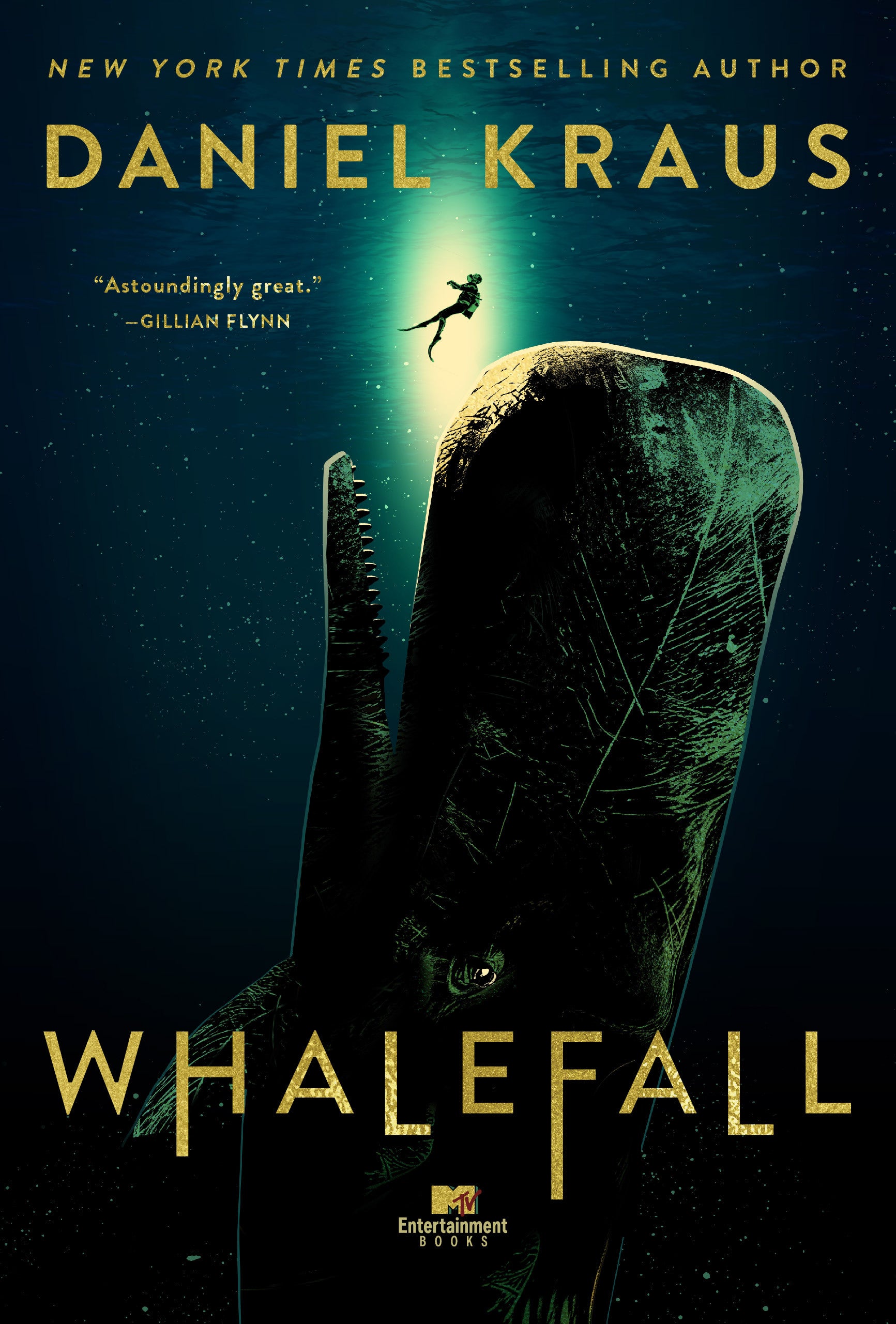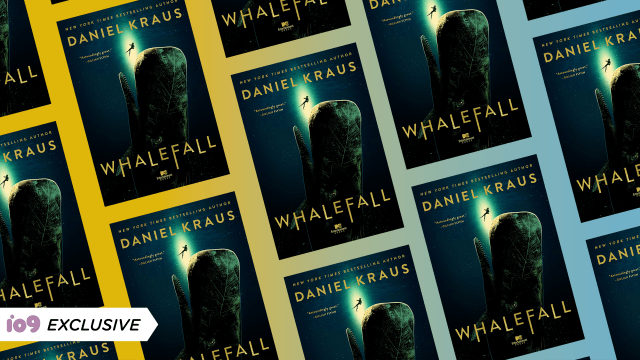It is a scientific fact that 80% of the ocean’s floor has never been mapped — scientists have mapped more of Mars than parts of our own planet. It’s in this unknown, relatively alien setting that Daniel Kraus sets his newest book, Whalefall.
io9 is excited to reveal the cover to this new science-fiction book from Kraus, as well as an exclusive interview with the author. Read the blurb and check out the cover and interview below!
Jay Gardiner has given himself a fool’s errand — to find the remains of his deceased father in the Pacific Ocean off the coast of Monastery Beach. He knows it’s a long shot, but Jay feels it’s the only way for him to lift the weight of guilt he has carried since his dad’s death by suicide the previous year.
The dive begins well enough, but the sudden appearance of a giant squid puts Jay in very real jeopardy, made infinitely worse by the arrival of a sperm whale looking to feed. Suddenly, Jay is caught in the squid’s tenacles and drawn into the whale’s mouth where he is pulled into the first of its four stomachs. He quickly realises he has only one hour before his oxygen tanks run out — one hour to defeat his demons and escape the belly of a whale.

Gizmodo: What inspired this story?
DK: In November 2020, I saw this video of two kayakers who briefly landed in the mouth of a humpback whale. It got me thinking: Could someone actually be swallowed alive by a whale? I instantly asked my friend Mary Roach, a nonfiction writer who has written about every imaginable oddity, and she told me she had, in fact, asked the same question to a whale scientist once. And the answer had been yes — provided that it was a large sperm whale, the only kind of whale with a throat that could fit a human. Why a whale would ever swallow a person, and how that person could survive the living hell of its innards were other questions…and questions I couldn’t help but start asking.
Gizmodo: I love that this is, essentially, a ‘lost in space’ book–did any science fiction tropes or motifs make their way into the story itself?
Daniel Kraus: That’s right. We’re dealing here with inner space rather than outer space, but the isolation within what feels like an alien world touches on classic lost-in-space elements. Two of my inspirations were sci-fi works. Andy Weir’s The Martian, for its minute-by-minute account of survival, and the movie Gravity, which is how I wanted Whalefall to feel — like the protagonist is fighting the odds at a cosmic level.
Gizmodo: Moby Dick, probably the seminal whale-centric novel of our century, was replete with facts about whales that were, actually, very wrong. Was accuracy important to you or did you go the Herman Melville route?
DK: Swallowed-by-whale stories are primal. They show up in our religions, our children’s entertainment (like Disney’s Pinocchio), and our popular fiction (like Arthur C. Clarke’s Childhood’s End). Most examples, though, are fantastical metaphors. It was surprising to me that no one had ever taken the idea seriously and straight-on. If I was going to do that, that would mean embracing reality (though, truly, few things are more fantastical than a sperm whale!) I befriended a bunch of sperm whale experts — then diving experts, then jellyfish experts, and so on — and spent months simply learning everything I could about what it’s like inside these behemoths. I also learned to scuba dive, visited the beach where the book is set, and that kind of stuff. In Melville’s defence, any artist is constrained by the limits of knowledge in their times. Even my experts confessed that I had a bit of leeway, because so much remains unknown about sperm whale behaviour.
Gizmodo: The structure of this novel shifts in between father-son lessons and the present moment–how did you balance the tension in between those two modes?
DK: It was a matter of playing the two timelines off each other. In life, your situation dictates what memories you draw up to inform the current moment. That can be good or bad. Sometimes, Jay has memories of his father that help him survive inside the whale. Other times, he has bad memories that sap his spirit. And then, of course, sometimes the human mind just wanders! So I had to leave room for that, too, the random bridges our synapses build between the present and past.
Gizmodo: How does Jay’s relationship with his father affect his relationship with nature?
DK: Jay’s father, Mitt, was a fierce advocate for the seas. But that came at the expense of everything else in his life: his family, his career, and so forth. He was a tyrant about it. So while Jay had a love of the ocean imprinted in him early, it got sullied by how he came to connect the water to his father. It was like when blood spreads in water — gradually, all Jay saw was the brutality of certain aspects of Mitt, and not the pure waters beneath.
Gizmodo: You listed ten authors who changed how you write, can you pick a couple from that list and explain how they changed your writing?
DK: Yes, the book is dedicated to ten authors who affected my writing, both living and dead. P. Djèlí Clark, for example, is the most recent addition to that list. He’s an author taking great, big, risky swings at giant topics and doing so with the most startling genre overlays; Ring Shout is a great example. Another writer on my list is Grace Metalious, who published Peyton Place in 1956. That book was a massive influence on me in regards to how dark ordinary people’s inner lives could be.
Gizmodo: There’s something very alien about a lot of deep sea creatures; how did you approach writing details to work in a way that seems both plausible and otherworldly in their strangeness?
DK: One of the first things that happens to Jay inside the whale’s stomach is that he realises he can see, thanks to the bioluminescent squids the whale has swallowed. That’s the kind of thing that is totally plausible, definitely strange, and even beautiful. It’s a well-trodden fact that we know far more about what’s on Mars than we know what’s inside our oceans. Humans have explored only 5% of the ocean. Five per cent! The ocean is an alien world. To write realistically about sea creatures is to write the fantastic.
Whalefall by Daniel Kraus will be released August 8, 2023; you can pre-order a copy here.
Want more Gizmodo news? Check out when to expect the latest Marvel, Star Wars, and Star Trek releases, what’s next for the DC Universe on film and TV, and everything you need to know about James Cameron’s Avatar: The Way of Water.
